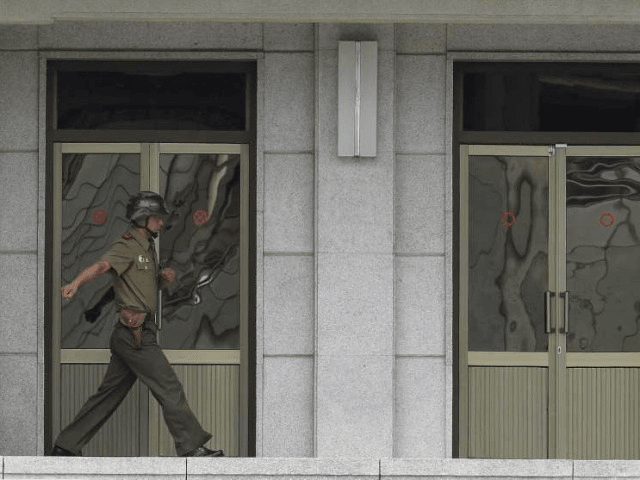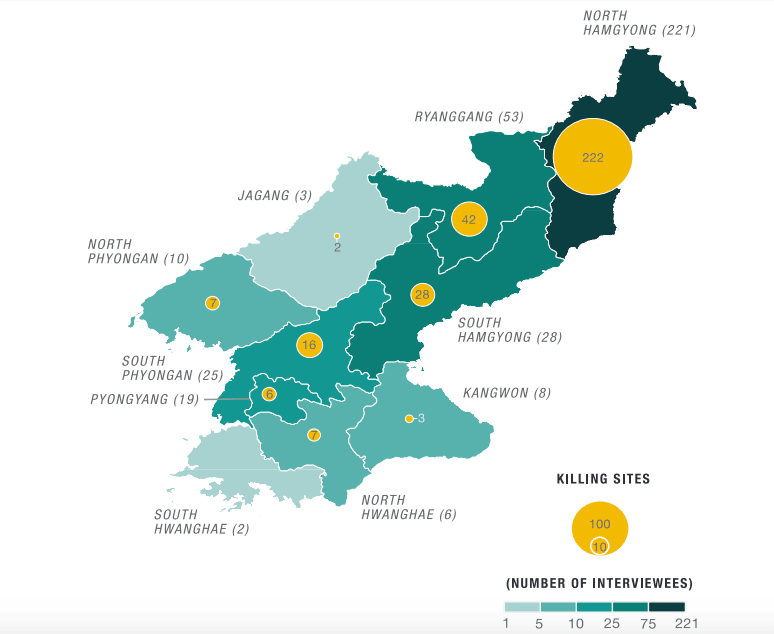A South Korean non-governmental organization (NGO) has interviewed hundreds of North Korean defectors with the goal of mapping where North Korea has established mass graves, where it conducts public executions, and where the government keeps sensitive files that may serve to bring justice for those tortured and killed by the communist regime.
In its July report “Mapping Crimes Against Humanity in North Korea,” the Transitional Justice Working Group (TJWG)—which receives significant U.S. funding—says it used satellite images while interviewing 375 North Korean defectors to find where they had witnessed public executions, where they believed the government kept mass graves, and where North Korea cremated the bodies of those who contracted contagious diseases or died of starvation. The defectors in question were chosen from locations all around the country and also shared stories of the kinds of executions they witnessed and why the government claimed these individuals must be killed.
The report states that the Kim dictatorship, according to eyewitnesses, conducted public executions in “public sports stadiums, in the local marketplace, on school grounds in the fringes of the city, or on mountainsides” for crimes including “stealing, transporting and selling copper components from factory machinery and electric cables; stealing livestock (especially cows, which are national property); stealing farm produce such as corn and rice; murder and manslaughter; human trafficking (including brokered defection and selling women for marriage in China); distributing South Korean media; organised prostitution; sexual assault; drug smuggling; and gang fighting.”
Among the most egregious reasons the North Korean government uses for executing a person are watching illegal movies and television or unspecified “espionage.” As North Korean imposes a strict caste system on its people known as “songbun,” those with the lowest songbun are likeliest to be executed. Songbun divides the nation into three major castes—core, the most loyal Kim supporters; wavering; and hostile, those from families that historically opposed Kim Il-song—which are then divided into more specific categories and determine which cities a North Korean can visit or live in. Those with bad songbun are banned from the capital, and bad songbun rarely improves through the generations.
Public executions appear to rarely deal with those in political disagreement with the Kim regime, as the government places these in labor camps in which the government appears to be “deliberately creating the conditions that lead to massive deaths of people,” according to a United Nations Human Rights Council report. The NGO notes that the UN considers these acts “akin to genocide” even though they are not meant to eliminate any particular “national, ethnical, racial or religious group.”
While the NGO’s study found that most publically executed were shot to death, multiple defectors said they had witnessed executions by gang beating. “Some crimes were considered not worth wasting bullets on,” the report read.
The report found over three hundred execution sites and 47 mass graves around the country, but its authors emphasize that their report is far from complete and that they have published it as a means of inviting international participation in piecing the narrative together.
The NGO’s findings echo the many stories North Korean defectors have made public of their times within the repressive communist state. “People were dying there, they don’t care … I saw the bodies on the street and I didn’t care because I was going to die,” Park Yeonmi, a North Korean defector who has written a book about her experiences in the country, said in a 2014 speech describing the execution of a neighbor for “watching a James Bond movie” and calling North Korea’s state “the same thing as the Holocaust.”
Jun Heo, a defector who spent time in a labor camp, explained in a recent interview that “being beaten black and blue and tortured within an inch of your life was routine” there. Lee So-yeon, a former North Korean soldier, told NPR sexual abuse of female soldiers in the country happened often. North Korea mandates military service for both men and women.


COMMENTS
Please let us know if you're having issues with commenting.